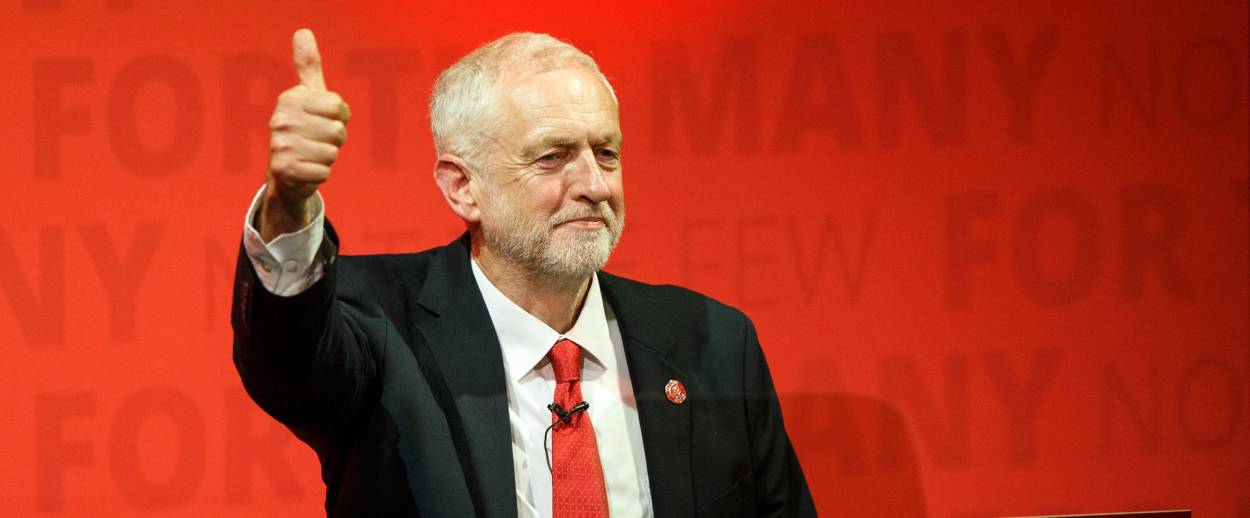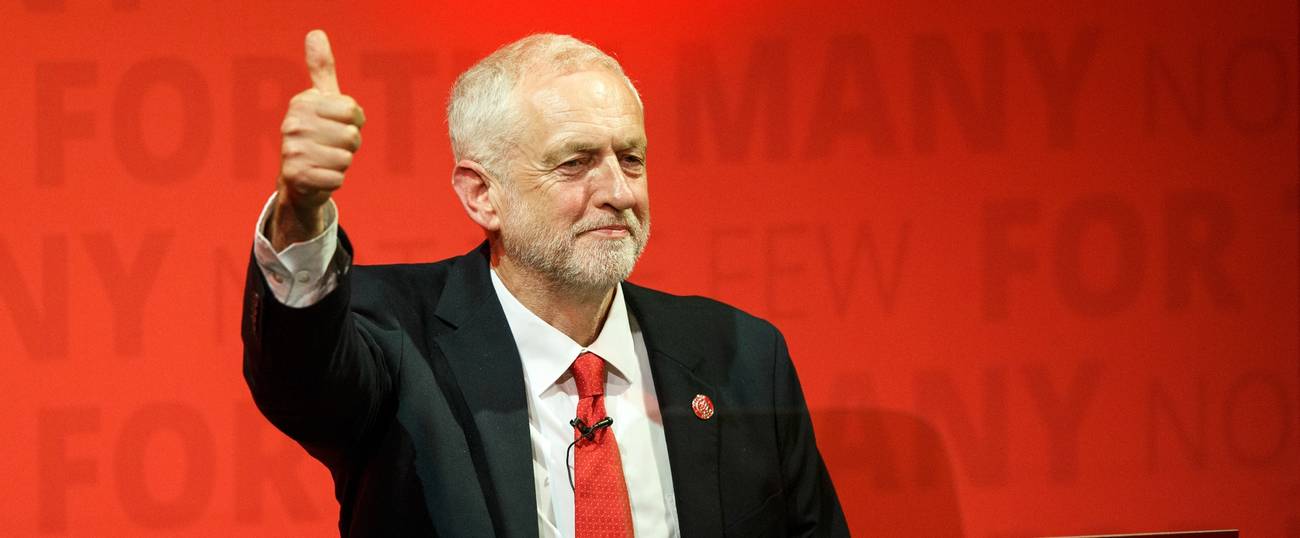On June 8, the United Kingdom will hold its general election. Today, the London Jewish Chronicle released its polling on the Jewish vote in the upcoming contest, and the numbers are stark. 77 percent of British Jews say they will vote for Theresa May’s Conservatives, with just 13 percent voting for the opposition Labour party. For comparison, the 2016 exit poll by the Council on American-Islamic Relations showed that Donald Trump received 13 percent of the Muslim vote.
What has driven British Jews to flee Labour like minorities who fled the Republican party under Trump? As in the United States, this exodus is significantly attributable to the party’s radical leader, in this case, Jeremy Corbyn. In fact, a whopping 54 percent of Jews surveyed said they would be more likely to vote for Labour if Corbyn were not in charge. Who then is Corbyn, and why are British Jews so repelled by him?
To begin with, Corbyn has a long history of unsavory associations with anti-Semites. Among other exploits, he has:
— Donated to the organization of Paul Eisen, a Holocaust denier, and appeared at his events. He later claimed he was unaware of Eisen’s unsavory views, despite 15 years of association.
— Defended vicar Stephen Sizer, who disseminated materials arguing the Mossad did 9/11, after he was banned from social media by the Church of England for posting anti-Semitic material.
— Praised preacher Raed Salah and invited him to parliament. Salah claims that Jews make their Passover matzoh with gentile blood, that Jews had foreknowledge of 9/11, and that homosexuality is “a great crime.” He has been banned from the U.K. for anti-Semitic incitement.
— Invited activist Dyab Abou Jahjah to parliament and spoke alongside him. Abou Jahjah had called the 9/11 attacks “sweet revenge,” said Europe made “the cult of the Holocaust and Jew-worshiping its alternative religion,” and called gays “Aids-spreading faggots.” He is now banned in the U.K.
— Campaigned for the release of Jawad Botmeh and Samar Alami, who were convicted in Britain in 1996 for bombing the Israeli Embassy in London and one of the country’s largest Jewish charities.
Taken together, this pattern of behavior suggests a blind spot for anti-Jewish prejudice at best, and incredibly poor judgment in allies and associates at the very least. After all, it is entirely possible to campaign against imperialism and other Western ills without legitimizing anti-Jewish bigots in the halls of parliament. (Suffice to say, if Donald Trump had engaged in such conduct, it would be national news and rightly so.)
If British Jews have taken note of Corbyn’s dalliances with anti-Semites, so have British anti-Semites, many of whom have flocked to Corbyn’s banner. Under his leadership, scores of party officials have had to be suspended or expelled for anti-Semitic hate, in most cases only after media coverage forced the party’s hand. Some of these Corbyn supporters have been captured claiming Israel was behind ISIS or 9/11 or the Sandy Hook Massacre, or asserting that Jewish bankers control Britain.
Most damning for Corbyn, however, has been the anti-Jewish bigotry expressed by his key associates and backers. One such supporter is Jackie Walker, a leader of Momentum, the far-left activist group that forms the backbone of Corbyn’s base. Walker is a committed Corbyn backer. She also claims that Jews were the “chief financiers” of the African slave trade, a classic anti-Semitic canard long debunked by historians; has criticized Britain’s Holocaust Memorial Day; and said she hasn’t “heard a definition of anti-Semitism that I can work with.” After her comment about the slave trade, she was suspended by the party, but by the end of the month, she was reinstated, even as she refused to apologize or retract her bigoted claim. Walker remained vice-chair of Momentum for months, until her remarks about anti-Semitism and Holocaust Memorial Day led her to be restricted to a less public role on the organization’s steering committee. If Corbyn has any problem with his support base being led by an anti-Semite, he has kept it to himself. He has not even criticized Walker’s slave trade slur. She remains a Labour party member in good standing.
Then there is former London mayor Ken Livingstone, whom Corbyn personally appointed to oversee a defense policy review. Livingstone had a long record of problematic entanglements with Jews, but this did not deter the Labour leader from selecting him. Predictably, Livingstone soon imploded in a blaze of anti-Semitic rhetoric and Holocaust revisionism, asserting on live TV that Hitler was a “Zionist,” that Zionist Jews collaborated with Hitler—gross distortions of the historical record—and that “a real anti-Semite doesn’t just hate the Jews in Israel.” Corbyn initially waffled on whether to suspend Livingstone from Labour, and was captured on video running away from a reporter asking him about it. Ultimately, Livingstone received a slap on the wrist from the party, which barred him from holding office for one year, but didn’t suspend or expel him from membership. This led 100 of Labour’s MPs to publicly denounce their own party for failing to combat anti-Semitism.
This conduct of Corbyn’s confidants and base, often with his tacit approval, has contributed to a toxic environment for Jewish politicians and journalists during his tenure. In one famous instance, Jewish Labour MP Ruth Smeeth was publicly accused of being part of a media conspiracy against Corbyn by a Momentum activist at a party event, while Corbyn stood by and said nothing. Smeeth walked out and later issued an emotional statement: “Until today I had made no public comment about Jeremy’s ability to lead our party, but the fact that he failed to intervene is final proof for me that he is unfit to lead, and that a Labour Party under his stewardship cannot be a safe space for British Jews.” The vitriol has extended to non-Jewish critics of Corbyn as well. After Labour’s Sadiq Khan, London’s first Muslim mayor, endorsed a challenger to Corbyn’s leadership, he was hit with anti-Semitic abuse on social media insinuating that he was under Jewish control. (Khan had previously criticized Corbyn for failing to adequately confront anti-Semitism in the party ranks.)
Journalists, and particularly Jewish ones, have similarly been targeted by Corbyn’s most zealous supporters, not unlike U.S. journalists who critically covered Donald Trump’s campaign. This anti-media direction comes from the top. Much like Trump, Corbyn has often had harsher words for those in the press who have covered racists in his base than he has had for the racists themselves. Thus, after leftist Guardian columnist Jonathan Freedland, one of Britain’s most prominent Jewish journalists, criticized Corbyn’s associations with anti-Semitic individuals, Corbyn was caught on tape grousing, “The big negative today is Jonathan Freedland in the Guardian… Labour has a problem with anti-Semitism under Corbyn. Utterly disgusting subliminal nastiness, you know. He’s not a good guy at all. He seems kind of obsessed with me, you know?”
Just this week, Jewish journalist Emma Barnett was subject to a torrent of abuse on social media—anti-Semitic and otherwise—after she interviewed Corbyn about childcare on the BBC and he appeared unable to answer some of her questions. To his credit, Corbyn apologized for her treatment by his supporters. That he only publicly repudiated this conduct days before an impending election, however, does not inspire much confidence, though it is a testimony to how blatant the abuse has become that he was forced to do so.
Just really, really depressing. pic.twitter.com/nOv6UYQiPT
— Jo Green (@jg_ccpress) May 30, 2017
Corbyn has thus left progressive Jews with a profoundly unpalatable choice, pinned between the party whose ideology they share and its disquieting leader and his most zealous supporters. One does not envy their decision.

